Golden retrievers bring pet therapy to Manawatu retirement homes
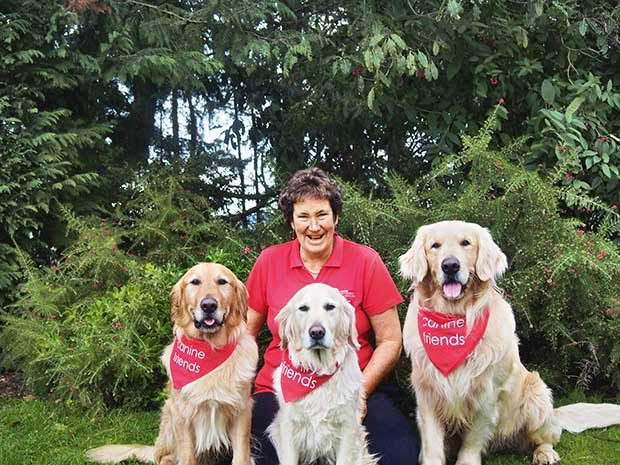
Ann with Oakie, Sophie and Thumpa.
The president of Canine Friends Pet Therapy is used to people looking straight past her or peeking over her shoulder, but Ann Evans is happy to step aside and let her furry stars shine.
Words: Cheree Morrison
Sophie was just two years old when she first donned a red bandana and took on the role of a lifetime. That was a big day.
The cheerful accessory came with great responsibility, something very new for a pup whose waking hours normally revolved around trying to catch her own tail and making sure her brother Oakie (AKA Okie Dokie) didn’t steal her favourite sunny spot on the deck.
A decade on, and while Sophie’s hearing and eyesight are “selective”, says her owner Ann Evans, the bandana still evokes puppy-like enthusiasm. Her big brown eyes twinkle as she hops from side to side on saucer-sized feet. It’s time for her favourite job.
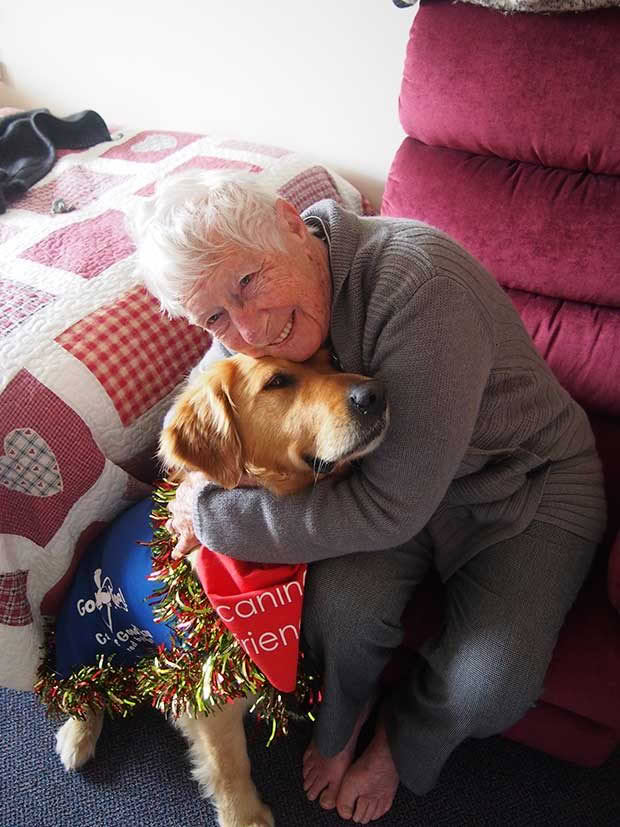
Winnie with Oakie.
Golden retriever Sophie is one of 600 dogs in New Zealand enrolled in Canine Friends Pet Therapy. As committed volunteers Sophie and Ann have been donating their time to rest homes, hospitals, hospices and schools throughout Manawatu for 10 years.
If someone needs a dog to cuddle whether for stress relief, a distraction from a medical issue or for company, the team, and a colourful collection of pooches, is never far away.

Canine Friends began in Wellington 28 years ago. Now the nationwide programme has more dogs than one could toss a tennis ball to. All breeds (apart from those banned in New Zealand) are potential volunteers.
They must be over a year old, and undergo a temperament and good-behaviour assessment to see how they react to certain situations. All the dogs are pets and don’t receive specialized training; they just need to be calm and gentle, love a good pat and be at ease as the centre of attention.
There are no preferred breeds; the bandanas fit everything from a chihuahua to a saint bernard, but the most commonly enrolled are golden retrievers (sweet and soft), labradors (gentle and kind) and greyhounds (outstandingly lazy and beloved by older gentlemen who enjoy a good yarn about the races).
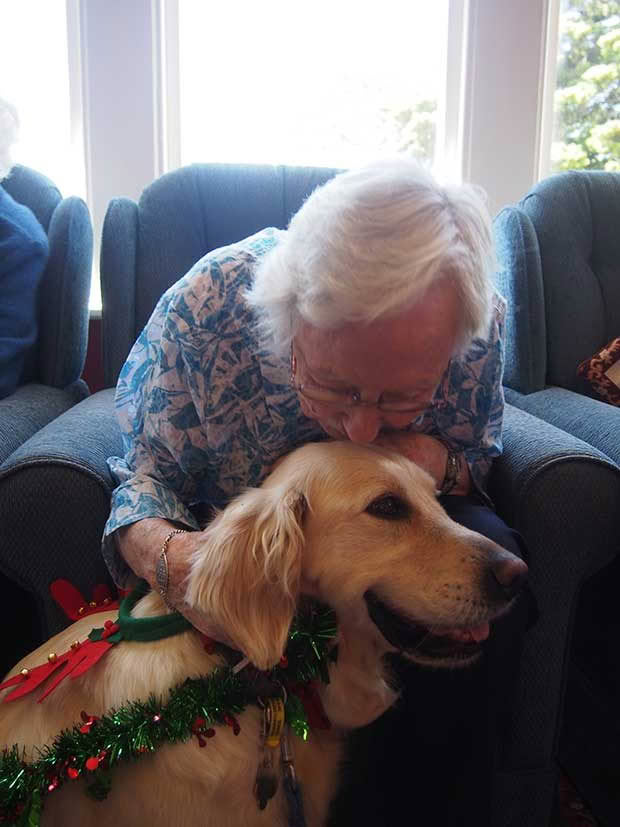
Ann lives in rural Ōhingaiti, north-east of Bulls, with husband Paul and their motley crew of canines: six working dogs plus a few youngsters in training and their three beautiful “but useless” pets. Ann was a city girl until she met farmer Paul.
So began a love story not only with her husband-to-be but with his dogs. Over the years, the couple has raised multiple litters of retriever puppies and is heavily involved in the national sheepdog trials (Paul and his pack have won many accolades).
“My first dog was a golden cocker spaniel that Paul gave me as a wedding present in 1976,” explains Ann. Her first golden retriever followed in the late 1990s. “I had always loved retrievers. They love to meet people, love to please – and their temperament is almost bombproof. People can’t help themselves; the dogs bring out a desire to connect and cuddle.”
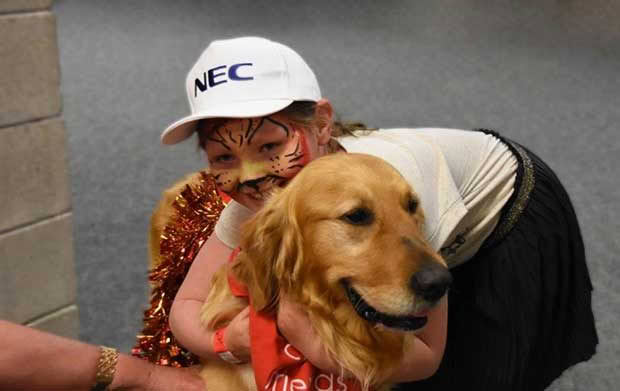
Most weeks Ann loads up the car with Sophie, Oakie or newbie Thumpa, and heads into Feilding, Marton and/or Whanganui to visit the local rest homes. Their visits are scheduled and much anticipated. “The dogs are great conversation starters.
If I were to walk in alone, no one would notice me, but if I have the dog, we’re the centre of attention. They melt the ice – sometimes we’ll have residents who may not speak to anyone, who aren’t happy where they are, but will open up to the dogs and enjoy their company. It’s a very special thing to be able to bring a smile to their face.”
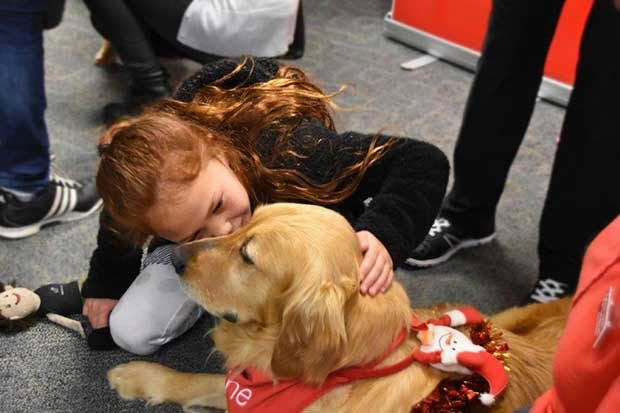
Ann and the threesome also pop into Massey University during study week to help students experiencing high levels of stress prior to exams. “It’s brilliant – you see the students walking in looking completely over it, as if they just can’t take any more, and then they just light up.”
Rehab and children’s wards, ICU units, as well as hospices have also embraced the programme, opening their doors to well-suited dogs for a few moments of pure happiness.
Although the round-trip visits take several hours and sometimes feel like an effort, Ann invariably returns home content. “I’ve never left a visit without laughing or smiling. I’ve had staff stop me and say, ‘You don’t realize what you’ve done today.’
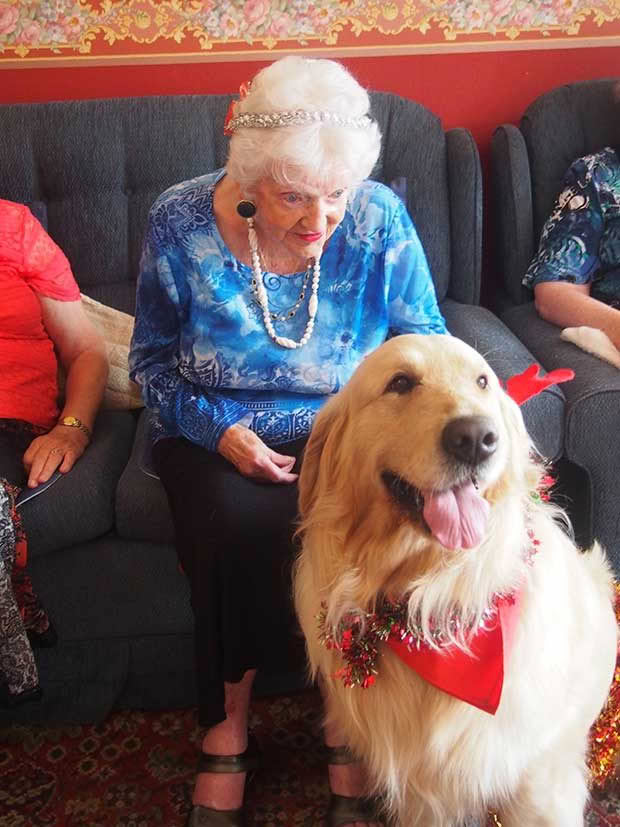
Doris with Thumpa.
These dogs make the residents’ or patients’ day; they make them talk, think and smile, and that’s our goal. They aren’t special dogs, just ordinary, lovely pets bringing happiness to people who need it.”
HOW TO GET INVOLVED
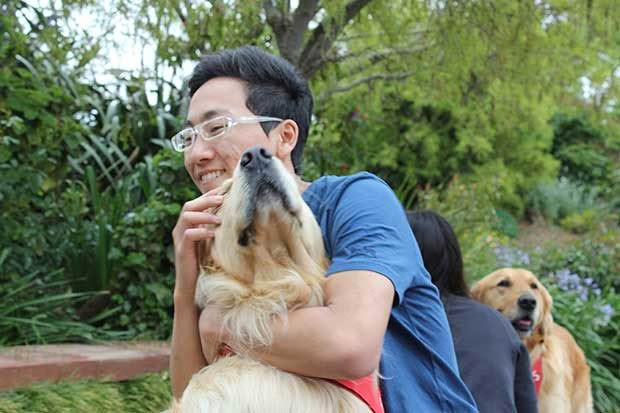
Thumpa gets a cuddle.
The website is the starting point for people looking to enrol their pets or considering bringing the service to a rest home or hospital.
There’s a waiting list; like a matchmaking service, the volunteers want to ensure the right dogs connect with the right people.
Volunteers must commit to a rostered visit, either fortnightly or monthly. Canine Friends is an entirely volunteer-based organization, so donations are gratefully received via their website.
Love this story? Subscribe now!
 This article first appeared in NZ Life & Leisure Magazine.
This article first appeared in NZ Life & Leisure Magazine.
